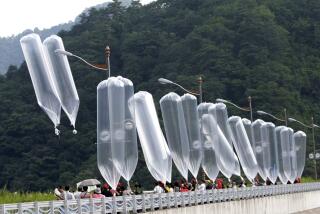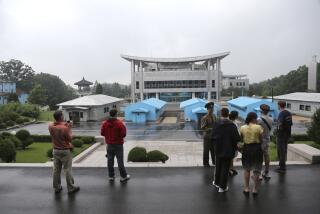Brazil’s Swift Action Could Save It From South Korea’s Fate
- Share via
RIO DE JANEIRO — With a wary eye on the still-smoldering wreckage of South Korea’s currency, Brazil is struggling to avoid a similar fate, convinced that a strong real is the key to keeping its three-year economic boom intact.
But does Brazil’s currency, thought by many economists to be 15% to 30% too rich compared with the dollar, stand a chance of avoiding a devaluation similar to the one South Korea finally bowed to after months of maneuvering and speculation?
The answer is important not only to Brazilians, but to dozens of U.S. companies that have found a lucrative market here. U.S. exports to Brazil have doubled to more than $12.7 billion since 1993, and a significantly weaker currency would lessen Brazilians’ spending power and, by extension, their appetite for U.S. goods.
The evidence so far suggests that South Korea could have learned a few things from the series of tough austerity measures undertaken by Brazil.
“Brazil is taking the strong medicine it has to to ensure its long-term health, while Korea put off addressing its problems too long,” said Jeffrey Schott, senior fellow at the Institute for International Economics in Washington. “If it had acted as quickly as Brazil, Korea wouldn’t be in the fix it is today.”
Economists who support Brazilian President Fernando Henrique Cardoso’s staunch defense of the real--and his policy of a slow devaluation at an annual rate of about 8%--base their optimism on Brazil’s economic strengths. Unlike South Korea, it has substantial foreign reserves, low short-term foreign debt and a banking system that is in reasonably solid shape after a wrenching restructuring in 1994.
Also unlike South Korea, Brazil acted quickly this month to address the speculative attacks on the real, setting up several walls of defense--including 43% interest rates--between speculators and the currency. Speculators typically borrow reals to buy dollars, so the higher rates made the cost of “playing poker” much higher.
In addition, Brazil’s government announced a wide-ranging austerity program to fix what most economists agree are Brazil’s main liabilities: an alarmingly high budget and foreign trade deficits. Those measures include cutbacks in the federal bureaucracy and accelerated privatizations of state-owned businesses, which could raise as much as $100 billion in cash over the next three years.
The latest news is mostly positive. Brazil’s largest stock market has largely recovered from a 10.2% sell-off Nov. 12, and interest rates are down slightly since the central bank doubled them on Nov. 2. The central bank is spending dramatically less--about $2 billion so far this month, sources say--to defend the currency than it was in October, when it spent $8 billion.
In Tuesday trading, Brazil’s Bovespa stock index rose 80 points to 9,150, up 0.9%, on optimism that Brazil’s Congress today will approve a key element of Cardoso’s austerity program that will pave the way for firing at least 33,000 government employees.
Brazil has hard currency reserves of about $53 billion, which, figured as a ratio to imports, is more than twice what prudence would dictate, said Lawrence Goodman, chief economist for Santander Investments in New York and a Latin American specialist.
To be sure, many warn that Brazil’s growing trade and budget deficits--a notch larger than South Korea’s--will continue to pose problems for the world’s 10th-largest economy and subject it to whipsaw effects like those of the “Asian contagion” unless the red ink is significantly staunched in coming months.
Schott and others warn that Brazil is still at the mercy of foreign economic turbulence and that its 2-week-old stabilization is fragile because it is a major borrower in international capital markets.
Thus, Brazil is vulnerable to investors’ disenchantment with emerging nations, a sentiment that translates into a higher cost for credit, said Desmond Lachman, chief emerging-markets economist with Salomon Bros.
“The Brazilians have been very pragmatic about their problems,” Lachman said. “They are not in a stage of denial, not taking an ostrich-in-the-sand approach, as the Asian countries took.” But, citing Brazil’s large foreign credit needs, he added, “They’re still exposed.”
Santander’s Goodman agreed: “Confidence in local and international investment markets will remain a factor for Brazil. It’s going to be vulnerable [to global gyrations] because of its deficits.”
A plus for Brazil is that its short-term debt is low and manageable, said Mauro Schneider, chief economist with ING Barings investment bankers in Sao Paulo. And its banking system--the source of South Korea’s downfall--has been strengthened through mergers and privatizations since the Mexican peso crisis in late 1994.
“Korea had very large short-term external debt, much larger than its reserves, and we don’t have that,” Schneider said.
Another problem looming for Brazil is the 40% interest rates imposed this month that, in addition to discouraging speculators, were designed to reduce the trade deficit by dissuading Brazilian consumers from buying imported, big-ticket items.
Although Brazilian officials characterize the exorbitant rates as a short-term measure that will remain in place only until Brazil’s markets stabilize, Joao Teixeira, assistant managing director at Dresdner Kleinwort Benson investment bankers, believes their continuation will send the country into a deep recession.
“Rates will have to be reduced gradually early next year to limit a recession, but it’s a very delicate game to play when there is so much turbulence out there,” Teixeira said.
*
* APEC OKs ASIA STRATEGY
APEC leaders at Vancouver summit OK strategy to combat Asia’s woes. A1
* JAPANESE PRESSURE
Pressure mounts in Japan for action to quell markets’ ire by aiding banks. A1
More to Read
Sign up for Essential California
The most important California stories and recommendations in your inbox every morning.
You may occasionally receive promotional content from the Los Angeles Times.













